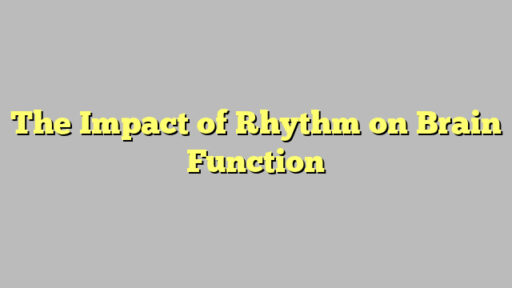Rhythm is a fundamental aspect of music and has been found to have a significant impact on brain function. From the primal beats of tribal drums to the intricate rhythms of classical music, the way in which our brains respond to rhythm is a fascinating subject of study.
How Rhythm Affects the Brain
Research has shown that when we listen to or engage with rhythmic music, various areas of the brain are activated. The auditory cortex, which processes sound, is of course involved in processing the rhythm of music. Additionally, the motor areas of the brain are activated, as our bodies naturally want to move in time with the rhythm.
The Benefits of Rhythm on Brain Function
There are numerous benefits to engaging with rhythm and music in general. One of the most well-known benefits is the effect of rhythm on mood. Listening to upbeat, rhythmic music can boost serotonin levels in the brain, leading to feelings of happiness and well-being.
Rhythm also has a positive impact on cognitive function. Studies have shown that individuals who regularly engage with rhythmic activities such as drumming or dancing have improved memory, attention, and problem-solving skills.
Rhythm Therapies
Given the powerful impact of rhythm on brain function, many therapists and healthcare professionals now utilize rhythm-based therapies to treat a variety of conditions. From music therapy for individuals with autism to drumming circles for stress relief, the applications of rhythm in therapy are vast and varied.
Conclusion
The impact of rhythm on brain function is a fascinating and complex subject. From improving cognitive function to boosting mood, the benefits of engaging with rhythm are clear. Whether through listening to music, participating in rhythmic activities, or utilizing rhythm therapies, incorporating rhythm into our daily lives can have a profound impact on our overall well-being.
FAQs
Q: Can listening to music with a steady beat improve focus and concentration?
A: Yes, research has shown that listening to music with a steady beat can help improve focus and concentration, particularly in tasks that require sustained attention.
Q: Is there a difference in how the brain responds to different types of rhythms?
A: Yes, studies have shown that different types of rhythms can elicit different responses in the brain. For example, fast rhythms may increase arousal levels, while slow rhythms may have a calming effect.
Q: How can I incorporate more rhythm into my daily routine?
A: There are many ways to incorporate rhythm into your daily life, such as listening to rhythmic music while exercising, participating in dance or drumming classes, or simply tapping along to the beat of your favorite songs.
Unlock Your Mental Potential




